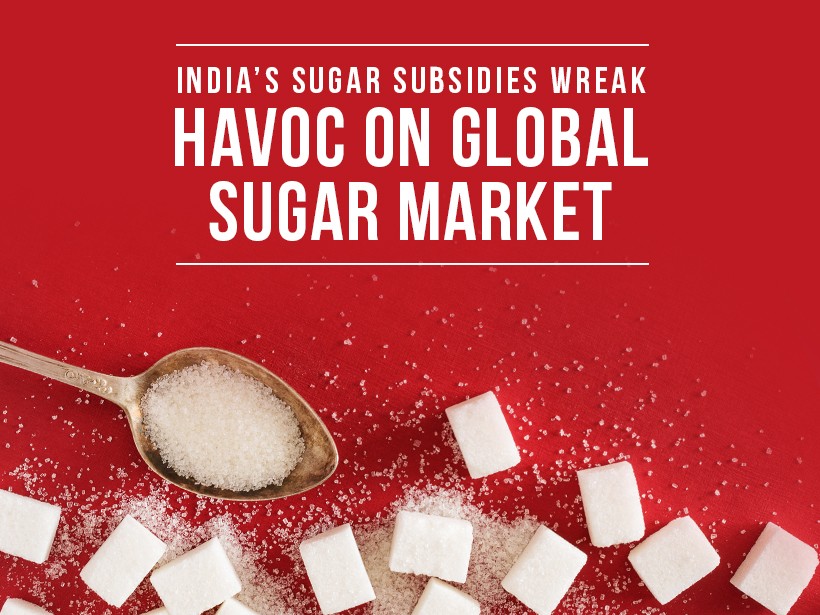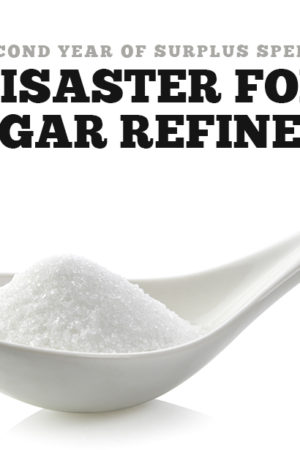Australia and India are gearing up to go to war…over sugar.1 Don’t expect this to be a war between soldiers, however; this war will be fought by representatives of both countries before the Agriculture Committee of the World Trade Organization. The Australian government wants to take India to international trade court, blaming them for wreaking havoc on the already volatile global price of sugar. At the heart of this controversy is the Indian government’s policy of heavily subsidizing its sugar industry. What’s going on?
Overproduction of sugar in India
Consumers demand less sugar than in years past. Steadily decreasing demand has produced sugar prices that have hit record lows; in fact, they're the lowest sugar prices we've seen in ten years. A second factor nearly guarantees prices will stay this way: India. As prices decrease internationally, Indian sugar farmers are producing record amounts of sugar. This year, India added over seven million tons to its four-million-ton surplus.2 Since this surplus exceeds the needs of domestic consumers, Indian merchants are left with only one option: sell the sugar on the global market.
India’s sugar is expensive to produce and impossible to sell
Unfortunately, India produces sugar at a greater cost than its global competitors, as much as 33 percent more expensive.3 Major exporters of sugar like Brazil and Indonesia dominate the global market with efficient production methods. Without government support, Indian sugar producers are stuck with tons of sugar they can’t sell domestically (because it’s not needed) or abroad (because it’s too expensive).
The Indian government’s solution: subsidies
Earlier this year, India’s government allowed manufacturers to export their sugar; but with the cost of production exceeding the international price, Indian sugar producers can't market their product on a global scale without sustaining significant losses. As a solution, the government began paying mills a portion of the cost to crush sugar. Even though this incentive made exporting feasible, producers still sold at a loss. Therefore, India has since decided to expand subsidies even further, offering direct payments to farmers as well as financial assistance for transportation to ports.4
The end result is that India's artificially cheap sugar has invaded the international market and depressed global prices. The critical issue is not the price of Indian sugar, but the quantity of it. India subsidized its sugar industry to make the price competitive on the international market, then dumped large amounts of sugar into that market. With the global demand for sugar stagnating as consumers select healthier options, the excess of supply drove the price of sugar even lower, frustrating the international community.
What’s next for India and its sugar problem?
Australia’s move to take India to task over its manipulation of sugar prices indicates that India’s excess sugar issue has become the world’s surplus sugar problem. India is projected to exceed last year’s production once again in the 2018-19 growing season, ensuring another year of problems for the country. Add to this the ongoing downward trend of sugar consumption, and we can expect to see a sugar surplus for several years to come.
NUTRITIONAL DISCLAIMER
The content on this website should not be taken as medical advice and you should ALWAYS consult with your doctor before starting any diet or exercise program. We provide nutritional data for our recipes as a courtesy to our readers. We use Total Keto Diet app software to calculate the nutrition and we remove fiber and sugar alcohols, like erythritol, from the total carbohydrate count to get to the net carb count, as they do not affect your blood glucose levels. You should independently calculate nutritional information on your own and not rely on our data. The website or content herein is not intended to cure, prevent, diagnose or treat any disease. This website shall not be liable for adverse reactions or any other outcome resulting from the use of recipes or recommendations on the Website or actions you take as a result. Any action you take is strictly at your own risk.
- Keto Might Give Navy SEALs an Advantage - July 18, 2019
- The Primary Roles of Fat in Our Diets - July 8, 2019
- Low Carb Tech is Transforming Diabetes Treatment - June 21, 2019































